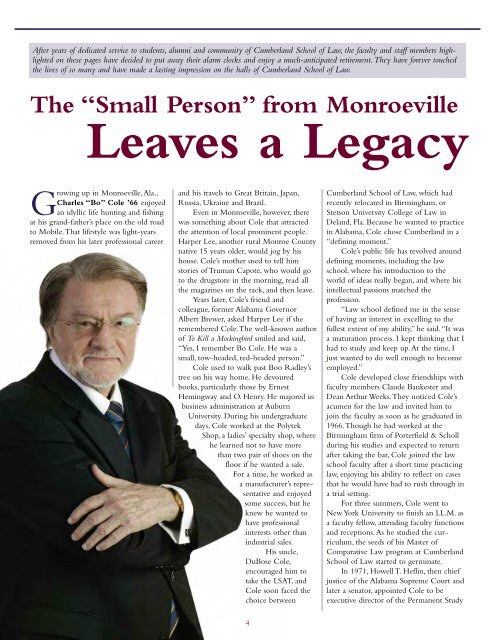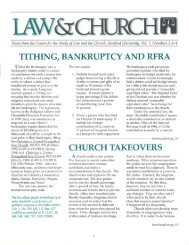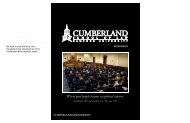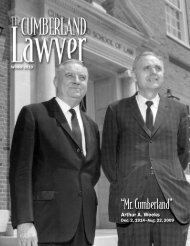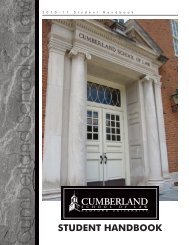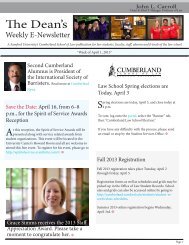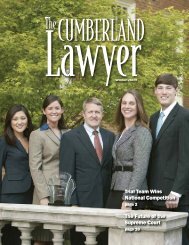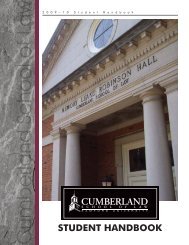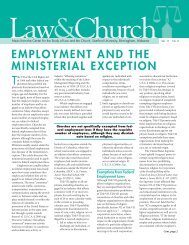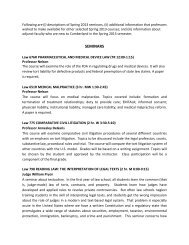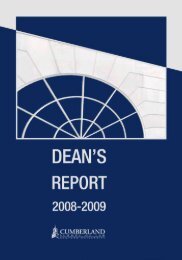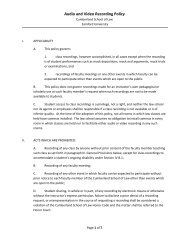Fall 2008 - Cumberland School of Law - Samford University
Fall 2008 - Cumberland School of Law - Samford University
Fall 2008 - Cumberland School of Law - Samford University
You also want an ePaper? Increase the reach of your titles
YUMPU automatically turns print PDFs into web optimized ePapers that Google loves.
After years <strong>of</strong> dedicated service to students, alumni and community <strong>of</strong> <strong>Cumberland</strong> <strong>School</strong> <strong>of</strong> <strong>Law</strong>, the faculty and staff members highlighted<br />
on these pages have decided to put away their alarm clocks and enjoy a much-anticipated retirement.They have forever touched<br />
the lives <strong>of</strong> so many and have made a lasting impression on the halls <strong>of</strong> <strong>Cumberland</strong> <strong>School</strong> <strong>of</strong> <strong>Law</strong>.<br />
The “Small Person” from Monroeville<br />
Leaves a Legacy<br />
Growing up in Monroeville, Ala.,<br />
Charles “Bo” Cole ’66 enjoyed<br />
an idyllic life hunting and fishing<br />
at his grand-father’s place on the old road<br />
to Mobile.That lifestyle was light-years<br />
removed from his later pr<strong>of</strong>essional career<br />
and his travels to Great Britain, Japan,<br />
Russia, Ukraine and Brazil.<br />
Even in Monroeville, however, there<br />
was something about Cole that attracted<br />
the attention <strong>of</strong> local prominent people.<br />
Harper Lee, another rural Monroe County<br />
native 15 years older, would jog by his<br />
house. Cole’s mother used to tell him<br />
stories <strong>of</strong> Truman Capote, who would go<br />
to the drugstore in the morning, read all<br />
the magazines on the rack, and then leave.<br />
Years later, Cole’s friend and<br />
colleague, former Alabama Governor<br />
Albert Brewer, asked Harper Lee if she<br />
remembered Cole.The well-known author<br />
<strong>of</strong> To Kill a Mockingbird smiled and said,<br />
“Yes, I remember Bo Cole. He was a<br />
small, tow-headed, red-headed person.”<br />
Cole used to walk past Boo Radley’s<br />
tree on his way home. He devoured<br />
books, particularly those by Ernest<br />
Hemingway and O. Henry. He majored in<br />
business administration at Auburn<br />
<strong>University</strong>. During his undergraduate<br />
days, Cole worked at the Polytek<br />
Shop, a ladies’ specialty shop, where<br />
he learned not to have more<br />
than two pair <strong>of</strong> shoes on the<br />
floor if he wanted a sale.<br />
For a time, he worked as<br />
a manufacturer’s representative<br />
and enjoyed<br />
some success, but he<br />
knew he wanted to<br />
have pr<strong>of</strong>essional<br />
interests other than<br />
industrial sales.<br />
His uncle,<br />
DuBose Cole,<br />
encouraged him to<br />
take the LSAT, and<br />
Cole soon faced the<br />
choice between<br />
4<br />
<strong>Cumberland</strong> <strong>School</strong> <strong>of</strong> <strong>Law</strong>, which had<br />
recently relocated in Birmingham, or<br />
Stetson <strong>University</strong> College <strong>of</strong> <strong>Law</strong> in<br />
Deland, Fla. Because he wanted to practice<br />
in Alabama, Cole chose <strong>Cumberland</strong> in a<br />
“defining moment.”<br />
Cole’s public life has revolved around<br />
defining moments, including the law<br />
school, where his introduction to the<br />
world <strong>of</strong> ideas really began, and where his<br />
intellectual passions matched the<br />
pr<strong>of</strong>ession.<br />
“<strong>Law</strong> school defined me in the sense<br />
<strong>of</strong> having an interest in excelling to the<br />
fullest extent <strong>of</strong> my ability,” he said.“It was<br />
a maturation process. I kept thinking that I<br />
had to study and keep up. At the time, I<br />
just wanted to do well enough to become<br />
employed.”<br />
Cole developed close friendships with<br />
faculty members Claude Bankester and<br />
Dean Arthur Weeks.They noticed Cole’s<br />
acumen for the law and invited him to<br />
join the faculty as soon as he graduated in<br />
1966.Though he had worked at the<br />
Birmingham firm <strong>of</strong> Porterfield & Scholl<br />
during his studies and expected to return<br />
after taking the bar, Cole joined the law<br />
school faculty after a short time practicing<br />
law, enjoying his ability to reflect on cases<br />
that he would have had to rush through in<br />
a trial setting.<br />
For three summers, Cole went to<br />
New York <strong>University</strong> to finish an LL.M. as<br />
a faculty fellow, attending faculty functions<br />
and receptions. As he studied the curriculum,<br />
the seeds <strong>of</strong> his Master <strong>of</strong><br />
Comparative <strong>Law</strong> program at <strong>Cumberland</strong><br />
<strong>School</strong> <strong>of</strong> <strong>Law</strong> started to germinate.<br />
In 1971, Howell T. Heflin, then chief<br />
justice <strong>of</strong> the Alabama Supreme Court and<br />
later a senator, appointed Cole to be<br />
executive director <strong>of</strong> the Permanent Study


